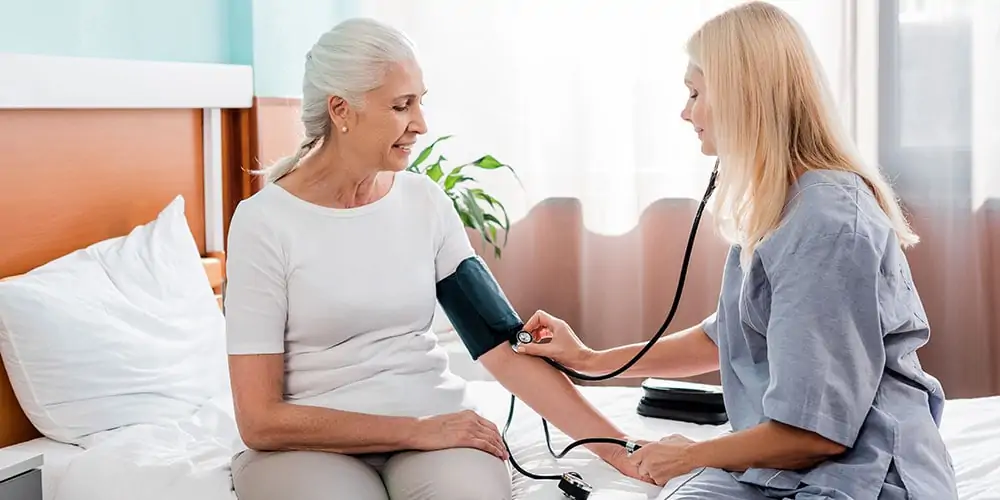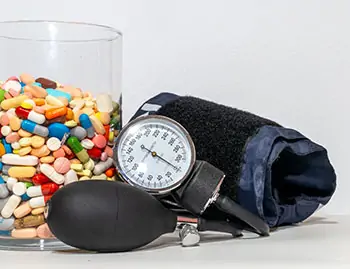Chronically high blood pressure (a.k.a. hypertension) is both intrinsically insidious and very versatile. It’s insidious because it almost never generates symptoms. You don’t know when you’re suffering from high blood pressure, because it doesn’t make you suffer. That’s why it’s earned the somewhat gangster-ish nickname: “the silent killer”.
High blood pressure’s versatility is demonstrated by the lengthy list of negative health conditions it can cause. We’ll get to that lethal list in a moment.
What is high blood pressure?
Blood pressure happens in your arteries, which are muscular tubes lined with smooth tissue. Arteries are pipelines that enable your heart to pump oxygen-enriched blood to wherever the oxygen is needed in your body.
When oxygenated blood travels from the heart to its destination in the body, it does so under pressure produced by the pulsations of your beating heart.
Blood pressure is measured in millimeters of mercury (mmHg). An optimal blood pressure reading is below 120/80 mmHg. The top number, called systolic pressure, is a measurement of the pressure in your arteries when your heart beats. The bottom number, called diastolic pressure, measures the pressure in your arteries when your heart is resting, between beats.
A blood pressure monitor is called a sphygmomanometer. Or, if you prefer, simply “the pressure cuff”.
What causes high blood pressure?
There are two types of high blood pressure. The first, known as primary hypertension, has no identifiable risk factors, apart from a family history of hypertension.
The second type is known as secondary hypertension. This kind of high blood pressure is caused by a different underlying condition. The conditions that cause secondary hypertension include:
- Obstructive sleep apnea
- Kidney disease
- Adrenal gland tumors
- Thyroid problems
- Certain congenital vascular defects
- Side effects of certain medications, such as birth control pills, some cold remedies, decongestants, over-the-counter pain relievers, and some prescription drugs, such as diuretics
- Drugs such as cocaine and amphetamines
Dangers from chronically high blood pressure
When your blood is constantly coursing through your arteries under higher pressure than normal, your heart has to work harder. Overwork can diminish heart health.
Also, some parts of your body may not be getting all the oxygen they require. Plus, high blood pressure causes the arteries to become rigid, inelastic, and blocked by accretions of cholesterol. Sometimes accumulated cholesterol will break off, creating new impediments to blood flow.
Here are most of the dangers inherent in high blood pressure. The risk of heart disease leads the list:
- Heart attack – just like all the other muscles in your body, your heart needs a regular supply of sufficient oxygen. When the oxygen supply to your heart is impeded by blocked, hardened, or narrowed arteries, your heart muscles begin to die. That death process is known as a heart attack.
- Cardiac arrest – cardiac arrest is an electrical problem, triggered by a disruption of the heart’s pulse rhythm.
That’s why an electrical instrument, called an automated external defibrillator (AED), is the instrument of choice for immediate treatment of cardiac arrest; it uses an electrical charge to restore that rhythm. - Heart failure – this occurs when the heart muscle can’t provide the blood supply that the body needs. This type of heart disease is usually a long-term, chronic condition, but it may arrive suddenly and without notice.
- Aneurysms – these balloon-like bulges in artery walls form when high blood pressure creates and/or acts upon a weakness in an arterial wall. A bursting aneurysm can be life-threatening.
- Kidney disease – when high blood pressure causes weakened or narrowed blood vessels in these vital organs, kidney damage can lead to kidney failure.
- Eye disease – the eyes are replete with tiny blood vessels that are vulnerable to damage from high blood pressure. High blood pressure can also cause swelling of the optic nerve. Lowered blood pressure can reverse some of these vision problems, but untreated hypertension can result in permanent vision loss.
- Mental difficulties – uncontrolled high blood pressure can undermine a person’s ability to think, learn, and remember.
- Vascular dementia – narrowed or blocked arteries can limit oxygenation of the brain, leading to a particular type of dementia. The same consequence can result from a stroke that interrupts blood flow to the brain.
- Stroke – the deposits of plaque that form on arterial walls due to hypertension can lead to blood clots. These clots can flow through your bloodstream until they lodge and block the blood flow to a portion of your brain. Oxygen deprivation of the brain can result in the type of brain damage commonly known as a stroke.
- Angina – this type of chest pain occurs when the heart’s own muscle is deprived of sufficient oxygen. When people with chronic hypertension engage in even moderate physical activity, they can experience the symptoms of angina: feelings of chest compression or chest pain.
- Sexual dysfunction – reduced blood flow to the genital area can cause erectile dysfunction and lowered libido.
- Increased risk of peripheral artery disease (PAD) – this condition involves narrowing of arteries in the legs, arms, stomach, or head. The symptoms include pain, cramping, and fatigue. PAD also increases the risk of heart attack and stroke.
- Risk of hypertensive crisis – this is one of the rare occasions wherein high blood pressure symptoms do become perceptible.
A hypertensive crisis entails a rapid rise of blood pressure to a level above 180/120. The characteristic symptoms of this medical emergency include vision problems, dizziness, severe headaches, nosebleed, shortness of breath, and chest discomfort or pain. If you experience these symptoms, obtain emergency medical aid immediately.
Ways to lower blood pressure
Once patients become aware that they have high blood pressure, effective health care is available.
Lifestyle changes may suffice for many patients. If you smoke, stop. If you drink alcohol, cut back. These combined with a healthier diet and increased exercise are tried and true methods of lowering blood pressure.
For more extreme hypertension, your doctor may recommend medication as well.
High blood pressure medications
There are many types of high blood pressure medications available and, when necessary, they can greatly help patients return to a healthy lifestyle. These include:
Diuretics
These high blood pressure medications flush extra water and sodium (salt) from your body. Diuretic medication’s side effects include:
-
- Extra urination. Extra water out means more time in the bathroom. Take these medications earlier in the day and when you’re not far away from a bathroom.
- Erection problems.
- Weakness, leg cramps, or fatigue. Diuretics may decrease the body’s levels of potassium, which can lead to these side effects. Certain potassium-sparing diuretics do not have this effect, however.
- Intense and sudden foot pain, which is a symptom of gout; this is rare.
Beta-Blockers
Beta-blockers make your heart beat slower and less forcefully. Beta-blocker medication’s side effects include:
-
- Asthma symptoms
- Cold hands and feet
- Depression
- Erection problems
- Insomnia and sleep problems
ACE (Angiotensin Converting Enzyme) Inhibitors
These medications block the formation of a hormone that causes blood vessels to narrow, so vessels relax. ACE inhibitor medication’s side effects include:
-
- A dry, hacking cough that doesn’t go away. If you have this side effect, the doctor may prescribe another type of medication.
- Skin rash and a loss of taste are two other possible side effects of ACE inhibitors.
Angiotensin II Receptor Blockers (ARBs)
These high blood pressure medications shield blood vessels from a hormone that causes blood vessels to narrow. This allows blood vessels to stay open. ARB high blood pressure medication’s side effect is mainly dizziness.
Calcium Channel Blockers (CCBs)
These high blood pressure medications keep calcium from entering heart muscle and blood vessel cells. Blood vessels can then relax. Calcium channel blocker medication’s side effects include:
-
- Constipation
- Dizziness
- Headache
- Irregular or very rapid heartbeat (palpitations)
- Swollen ankles
Alpha-Blockers
Alpha-blockers reduce nerve impulses to blood vessels, allowing blood to flow more easily. Alpha-blocker medication’s side effects include:
-
- Dizziness, lightheadedness, or weakness when standing up suddenly or getting up in the morning (from reduced blood pressure)
- Fast heart rate
Alpha-2 Receptor Agonist
This high blood pressure medication decreases activity in the adrenaline-producing part of the nervous system. The main side effect is dizziness.
Alpha-Beta Blockers
These high blood pressure medications reduce nerve impulses and also slow the heartbeat. Patients with severe high blood pressure often receive them by intravenous (IV) injection. But the doctor may also prescribe these medications for people who have congestive heart failure.
Alpha-beta blockers may cause a drop in blood pressure when you stand up suddenly or first get up in the morning. Other side effects are mostly:
-
- Dizziness
- Lightheadedness
- Weakness
Central Agonists
These high blood pressure medications control nerve impulses, relaxing blood vessels. Central agonists’ side effects include:
-
- Anemia
- Constipation
- Dizziness, lightheadedness, or weakness when standing up suddenly or getting up in the morning (from a drop in blood pressure)
- Drowsiness
- Dry mouth
- Erection problems
- Fever
Peripheral Adrenergic Inhibitors
This type of medication blocks neurotransmitters in the brain, so the message to constrict doesn’t reach smooth muscles. Used less often than other high blood pressure medications, side effects include:
-
- Diarrhea
- Dizziness, lightheadedness, or weakness when standing up suddenly or getting up in the morning (from reduced blood pressure)
- Erection problems
- Heartburn
- Stuffy nose
- If you suffer from nightmares or insomnia persists, talk with your doctor about another medication option.
Vasodilators
Vasodilators relax muscles in vessel walls, opening blood vessels and allowing blood to flow better. Vasodilator medication’s side effects include:
-
- Excessive hair growth
- Fluid retention
- Headaches
- Irregular or very rapid heartbeat (palpitations)
- Joint aches and pains
- Swelling around the eyes
Renin Inhibitor
This newer class of high blood pressure medication works by decreasing chemicals that tighten blood vessels. This medication may be used alone or in combination with another medication.
What to do if high blood pressure drug side effects bother you
In other cases, your doctor may change the dosage or prescribe another high blood pressure medication. A combination of medications sometimes works better than one medication alone; combined medications not only improve high blood pressure control but also reduce side effects.
Also, when you first start a new high blood pressure medicine, be aware of rare allergic reactions. Call 911 right away if you develop hives, wheezing, vomiting, light-headedness, or swelling in your throat or face.
Why establish care with Dr. Aliabadi?
As one of the nation’s leading OB/GYN’s, Dr. Thaïs Aliabadi offers the very best in obstetrics and gynecology, including telehealth appointments. Together with her warm professional team, Dr. Aliabadi supports women through all phases of life. She creates a special one-on-one relationship between patient and doctor.
We invite you to establish care with Dr. Aliabadi. Please click here to make an appointment or call us at (844) 863-6700.
We take our patients’ safety very seriously. Our facility’s Covid-19 patient safety procedures exceed all CDC and World Health Organization recommendations. Masks are required in our office at all times during the coronavirus pandemic.
The practice of Dr. Thais Aliabadi and the Outpatient Hysterectomy Center are conveniently located for patients throughout Southern California and the Los Angeles area. We are near Beverly Hills, West Hollywood, Santa Monica, West Los Angeles, Culver City, Hollywood, Venice, Marina del Rey, Malibu, Manhattan Beach, and Downtown Los Angeles.


















